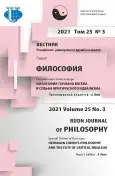Сознание, тело и душа: набросок ненаписанной Когеном психологии
- Авторы: Добер Х.М.1
-
Учреждения:
- Тюбингенский университет
- Выпуск: Том 25, № 3 (2021): ФИЛОСОФИЯ ГЕРМАНА КОГЕНА И СУДЬБА КРИТИЧЕСКОГО ИДЕАЛИЗМА
- Страницы: 420-435
- Раздел: ФИЛОСОФИЯ ГЕРМАНА КОГЕНА И СУДЬБА КРИТИЧЕСКОГО ИДЕАЛИЗМА
- URL: https://journal-vniispk.ru/2313-2302/article/view/325011
- DOI: https://doi.org/10.22363/2313-2302-2021-25-3-420-435
- ID: 325011
Цитировать
Полный текст
Аннотация
Современные подходы склонны понимать человеческое сознание как некий алгоритм, или же редуцировать человеческую субъективность либо к органически-естественным процессам, либо к социальному конструкту, обусловленному спецификой культуры. Все это становится серьезным вызовом для этического гуманизма, который, по-видимому, нуждается в новом обосновании и фундаменте. Как возможно постичь и отстоять концепцию воплощенной субъективности человека и его свободу действий? Каким образом мы можем мыслить единство мышления, воли и чувства, при этом не теряясь в различных специализированных способностях и удерживая фокус на личности как на находящейся в ясном сознании, ответственной и самодостаточной единице? Наконец, каким образом можно сохранить смысл понятия души, если это традиционное определение человеческой субъективности перестало употребляться, как будто скрывшись за горизонтом? В данном рассуждении представлена попытка найти ответы на эти вопросы с помощью Германа Когена, великого еврейского философа-неокантианца. Для этого предлагается обратиться к его психологии, о которой он неоднократно высказывался, но так никогда и не представил ее в систематическом изложении. Первая часть исследования посвящена истолкования ранней когеновской интерпретации Платона как «первичной клетке» его психологии. Далее показано, каким образом Коген отвечал на возникшие в связи с его психологическими штудиями вопросы и затруднения в трех разделах его философской системы - логике, этике и эстетике, в связи с чем особое внимание уделяется также философии религии Когена. Самодвижение души и ее глубокая связь с человеческим телом можно понимать и объяснять из единства человеческой культуры, а также всеобщности человека.
Ключевые слова
Об авторах
Ханс Мартин Добер
Тюбингенский университет
Автор, ответственный за переписку.
Email: hmdober@gmx.de
PhD, профессор, пастор, факультет протестантской теологии
Germany, 72076, Tübingen, Liebermeisterstraße, 12Список литературы
- Holzhey H. Gott und Seele. Zum Verhältnis von Metaphysikkritik und Religionsphilosophie bei Hermann Cohen. In: Moses S, Wiedebach H, editors. Hermann Cohen’s Philosophy of Religion: International Conference in Jerusalem 1996. Hildesheim/Zürich/New York: Georg Olms Verlag; 1997. P. 85-104.
- Cheng F. Über die Schönheit der Seele. Sieben Briefe an eine wiedergefundene Freundin. München: C.H. Beck Verlag; 2018.
- Mankell H. Treibsand. Was es heißt, ein Mensch zu sein. dtv Verlagsgesellschaft; 2017.
- McEwan I. Saturday. (trans. by Bernhard Robben). Zurich: Diogenes; 2005.
- Dierken J. Der Mensch und seine Seele. In: Scheliha A, Dierken J, editors. Der Mensch und seine Seele. Bildung - Frömmigkeit - Ästhetik. Akten des Internationalen Kongresses der Schleiermacher-Gesellschaft in Münster. September 2015, Berlin, Boston: De Gruyter; 2017. P. 1-7.
- Barth U. Selbstbewusstsein und Seele. In: Zeitschrift für Theologie und Kirche. 2004; (101):198-217.
- Fuchs Th. Verteidigung des Menschen. Grundfragen einer verkörperten Anthropologie. Berlin: Suhrkamp Verlag; 2020.
- Fuchs Th. Sind psychische Krankheiten Gehirnkrankheiten? In: Vogeley K, Fuchs Th, Heinze M, editors. Psyche zwischen Natur und Kultur. Berlin: Pabst/ Parodos Verlag; 2008. P. 67-79.
- Cohen H. Logik der reinen Erkenntnis. Berlin: B. Cassirer; 1902. = Cohen H. Werke: in 19 Bdn. Bd. 6 [ed. by the Hermann Cohen Archive at the Philosophical Seminar of the University of Zurich under the direction of H. Holzhey and H. Wiedebach]. Hildesheim, Zurich, New York: Georg Olms; 1977ff. [I quote the 1st edition (1902)].
- Cohen H. System der Philosophie. T. 2: Ethik des reinen Willens. Berlin: B. Cassirer; 1904. = Cohen H. Werke: in 19 Bdn. Bd. 7. Hildesheim, Zurich, New York: Georg Olms; 1977ff.
- Cohen H. Ästhetik des reinen Gefühls. Vol. 1. Berlin: B. Cassirer; 1912. = Cohen H. Werke: in 19 Bdn. Bd. 8.
- Cohen H. Ästhetik des reinen Gefühls. Vol. 2. Berlin: B. Cassirer; 1912. = Cohen H. Werke: in 19 Bdn. Bd. 9.
- Cohen H. Platons Ideenlehre, psychologisch entwickelt. In: Cohen H. Werke: in 19 Bdn. Bd. 12 [Holzhey H, Wiedebach H, editors]. Hildesheim, Zürich, New York: Georg Olms; 2012.
- Cohen H. Der Begriff der Religion im System der Philosophie. Gießen: Töpelmann; 1915. [Reprint publishing house Dr. Müller; 2006].
- Cohen H. Religion der Vernunft aus den Quellen des Judentums. 1919; Frankfurt a.m.: Kaufmann; 1929. [reprint Wiesbaden: Fourier; 1978].
- Aristotle. De Anima. Leiden, New York: E.J. Brill; 1994.
- Plato. Phaidros, 246a-249d. [summed up by J. Disse]. In: Disse J. Kleine Geschichte der abendländischen Metaphysik. Darmstadt: Primus Verlag; 2001.
- Dober HM. Seelsorge bei Luther, Schleiermacher und nach Freud. Leipzig: Evangelische Verlagsanstalt; 2008.
- Freud S. Eine Schwierigkeit der Psychoanalyse. In: Freud S. Gesammelte Werke. Band XII. Werke aus den Jahren 1917-1920. Frankfurt a.M.: S. Fischer; 1947. P. 3-12.
- Holzhey H. Der systematische Ort der "Religion der Vernunft" im Gesamtwerk Hermann Cohens. In: Holzhey H., Motzkin G., Wiedebach H., editors. "Religion der Vernunft aus den Quellen des Judentums". Tradition und Ursprungsdenken in Hermann Cohens Spätwerk. Hildesheim: Georg Olms; 2000. P. 37-59.
- Simmel G. Der Begriff und die Tragödie der Kultur [1911, reprinted]. In: Konersmann R., editor. Kulturphilosophie. Leipzig: Reclam; 1996. P. 25-57.
- Cassirer E. Die "Tragödie der Kultur. In: Konersmann R., editor. Kulturphilosophie. Leipzig: Reclam; 1996. P. 107-139.
- Fiorato P. "In einer Schwebe zwischen Erkenntnis und Sittlichkeit". Über Hermann Cohens Polyphonie des Systems. In: Wiedebach H., editor. Die Denkfigur des Systems im Ausgang von Franz Rosenzweigs "Stern der Erlösung". Berlin: Duncker & Humblot; 2013. P. 163-174.
- Cohen H. Werke: in 19 Bdn. Bd. 17 [Wiedebach H., editor]. Hildesheim/Zürich/New York: Georg Olms; 2002.
Дополнительные файлы









